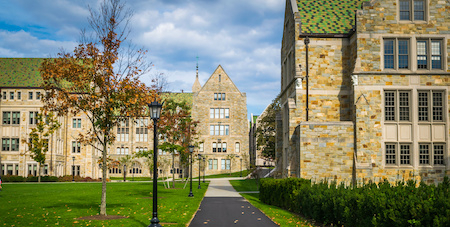By Nat, IvyWise college admissions counselor
When preparing for college visits, it’s important for families to plan ahead and register for official information sessions and campus tours. In some cases, families can overlook the information session by assuming it’s a general presentation with little impact as to whether a student will choose to apply there or not. This is a huge misconception, as the information session is a critical part of the college visit and gives families the best opportunity to get face time with the admissions office and have their questions answered by an actual admissions officer.
Information sessions are typically held at the admissions office prior to the campus tour. Groups of students and parents are usually given a short presentation on the college and offered the chance to ask any questions they have to get more information about the school’s offerings, admissions requirements, and more. Information sessions are usually run by current admissions officers, so families can get important information straight from the source.
While tours and info sessions are generally conducted in large groups, it’s still important to make a positive impression on the college officials leading these events. I offer some tips on what to do during information sessions, what to ask, and how to get the most out of your time on campus.
Steps for Planning Your Visit
- Call and schedule your visit up to three weeks in advance — online registration may also be available via the college’s website. Keep in mind that group sessions can fill up very quickly during peak visit times.
- Visit a college’s website. It’s helpful to do a little research about the school before you are on campus.
- Call the admissions office if your plans change and you can’t make it to your scheduled session. At some schools, this will be very helpful for the office to know, while it won’t matter at other institutions.
Steps to Take at the Information Session
- Silence your phone, and tell your parents and/or siblings to silence theirs as well. This seems obvious, but someone’s phone always goes off during a session. It’s not a huge deal, but it can sometimes interrupt the flow of the admissions officer.
- Try not to ask questions that are too specific to you. General questions are ok, but save specific ones for a personal interaction with the counselor afterward. Additionally, try not to ask questions that are easily found on the college’s website, if possible.
- Don’t have private conversations with your parents during the session. This also seems obvious, but I’m always surprised by the number of disruptive conversations between families. It’s usually after I’ve said something that is relative to a student’s interest.
- Ask for the admissions officer’s card after the information session and email them with any additional questions you may have.
Steps to Take While You’re on Campus
- Ask to meet with the person who travels to your high school, if applicable — this is more common among small liberal arts schools. Admissions officers often love to know when there is a student from their reading region on campus and will usually come out to say hello if time permits.
- Be respectful during the actual tour. All of the same points I mentioned above are relevant during the tour, too.
- Take time to sit and people watch on your own. Grab a bite to eat or sit in the student center just to get a feel for the culture of the school. Observe different interactions between students and staff members on campus. Walk down the hallways of different departmental offices to get a sense of whether professors are meeting with students or not. Don’t be shy to introduce yourself to a professor who has their door open. Professors usually don’t mind speaking with prospective students, and they can often give you a different perspective of the school.
If you’re planning college visits this year, come prepared and know what to expect.




